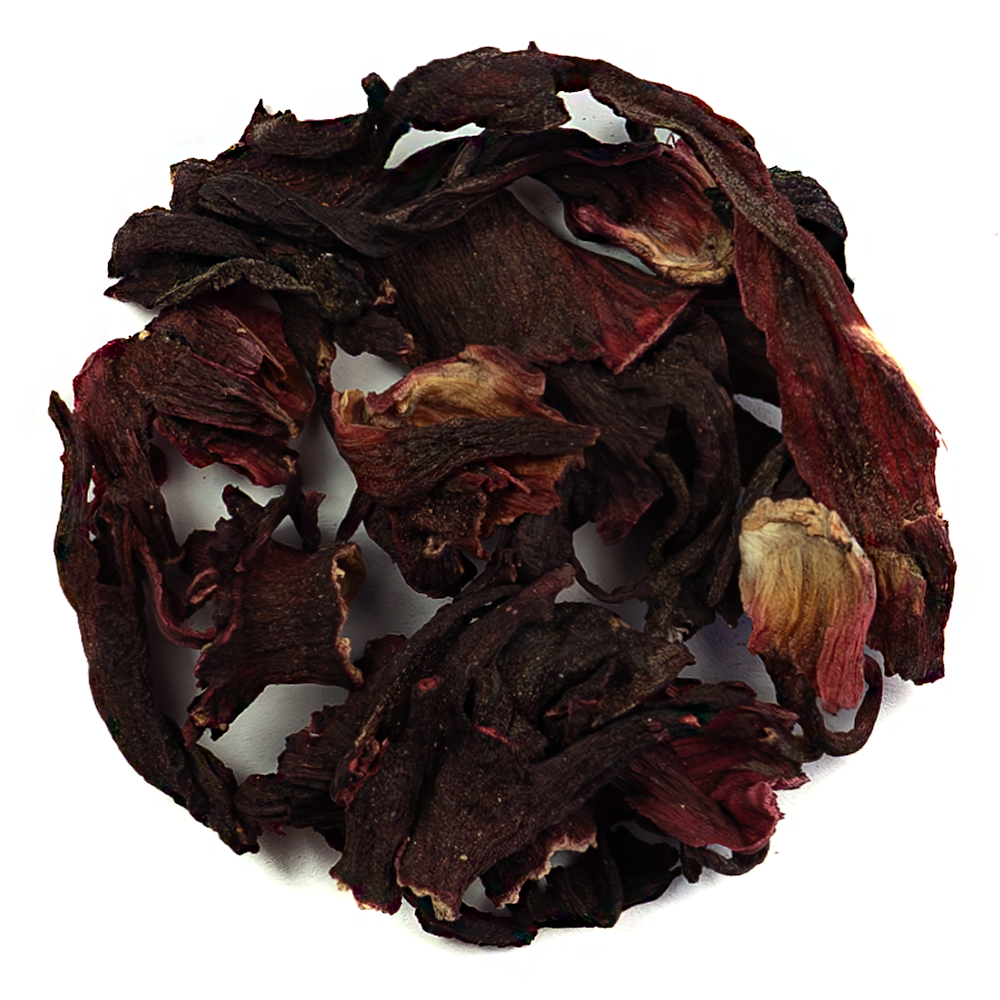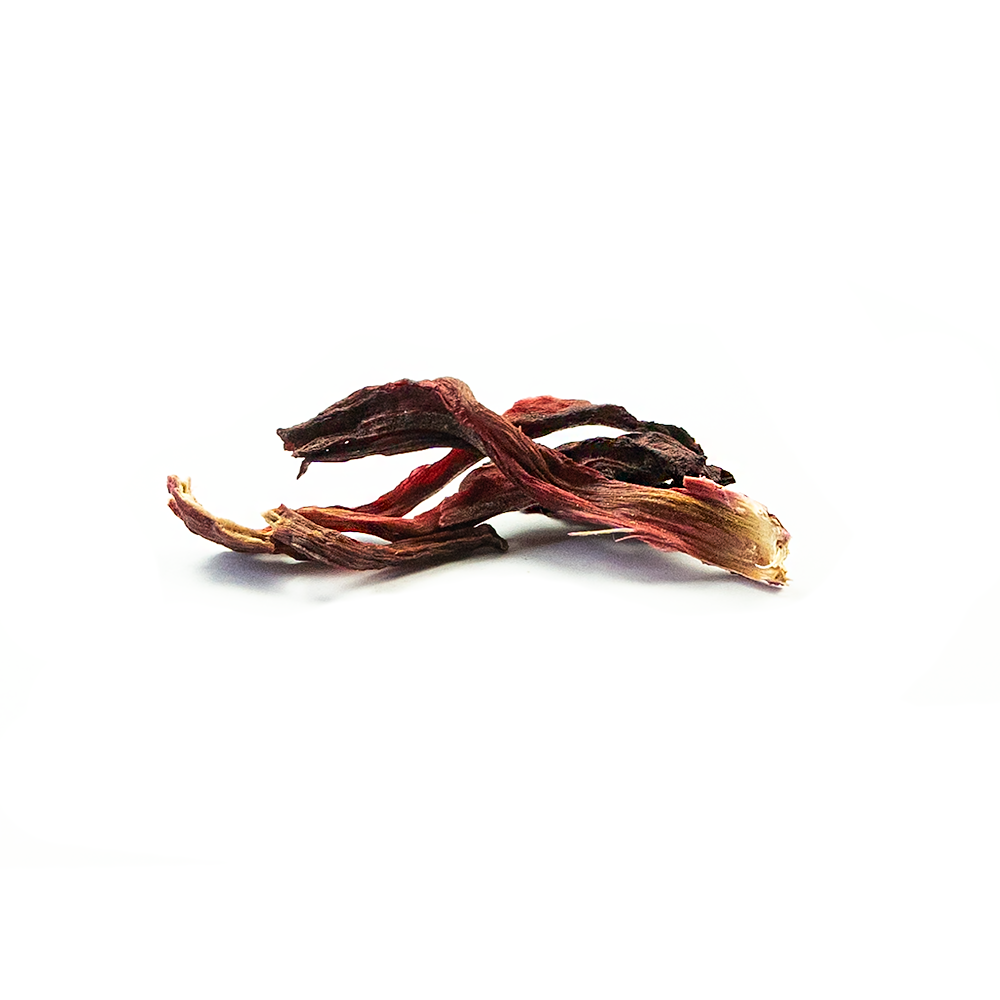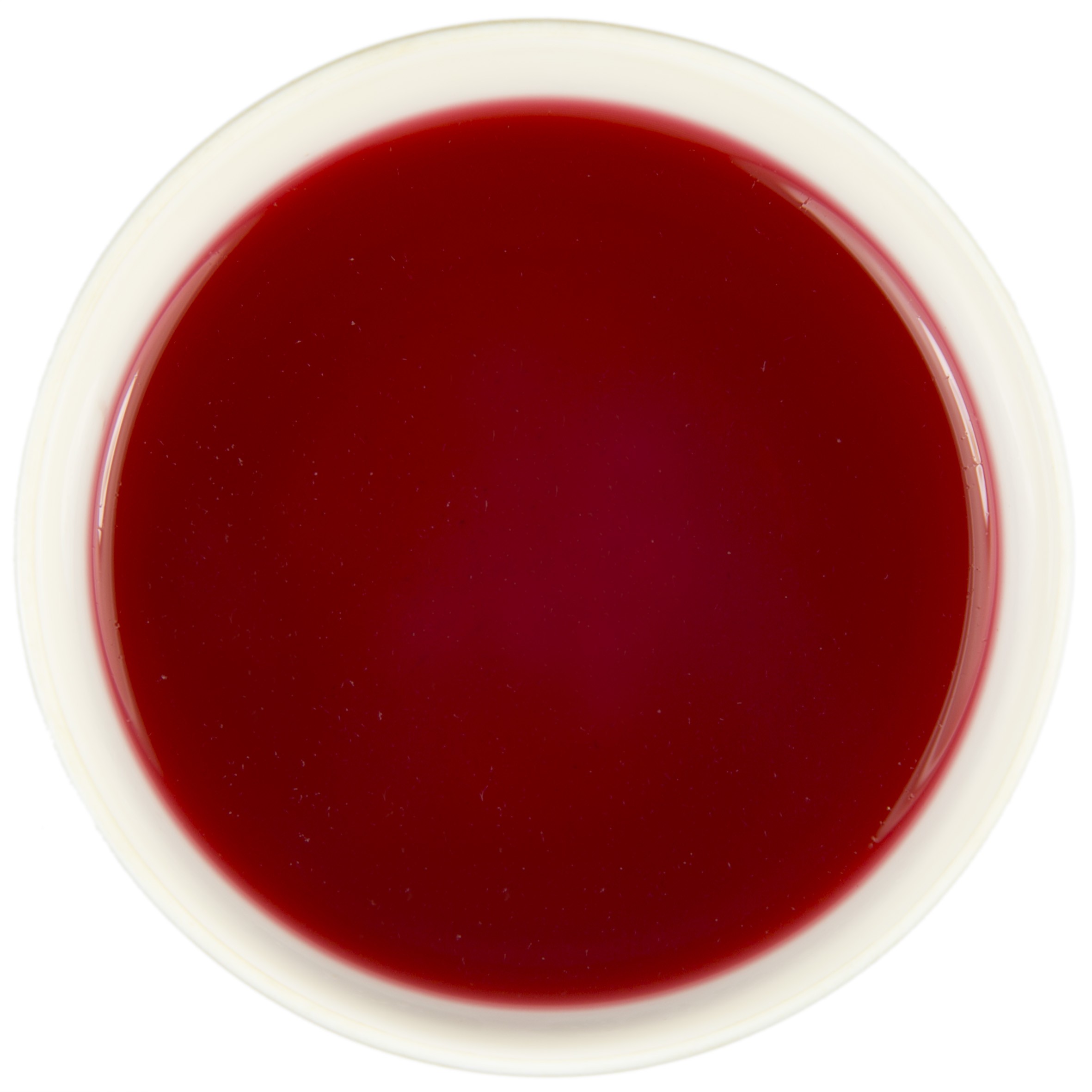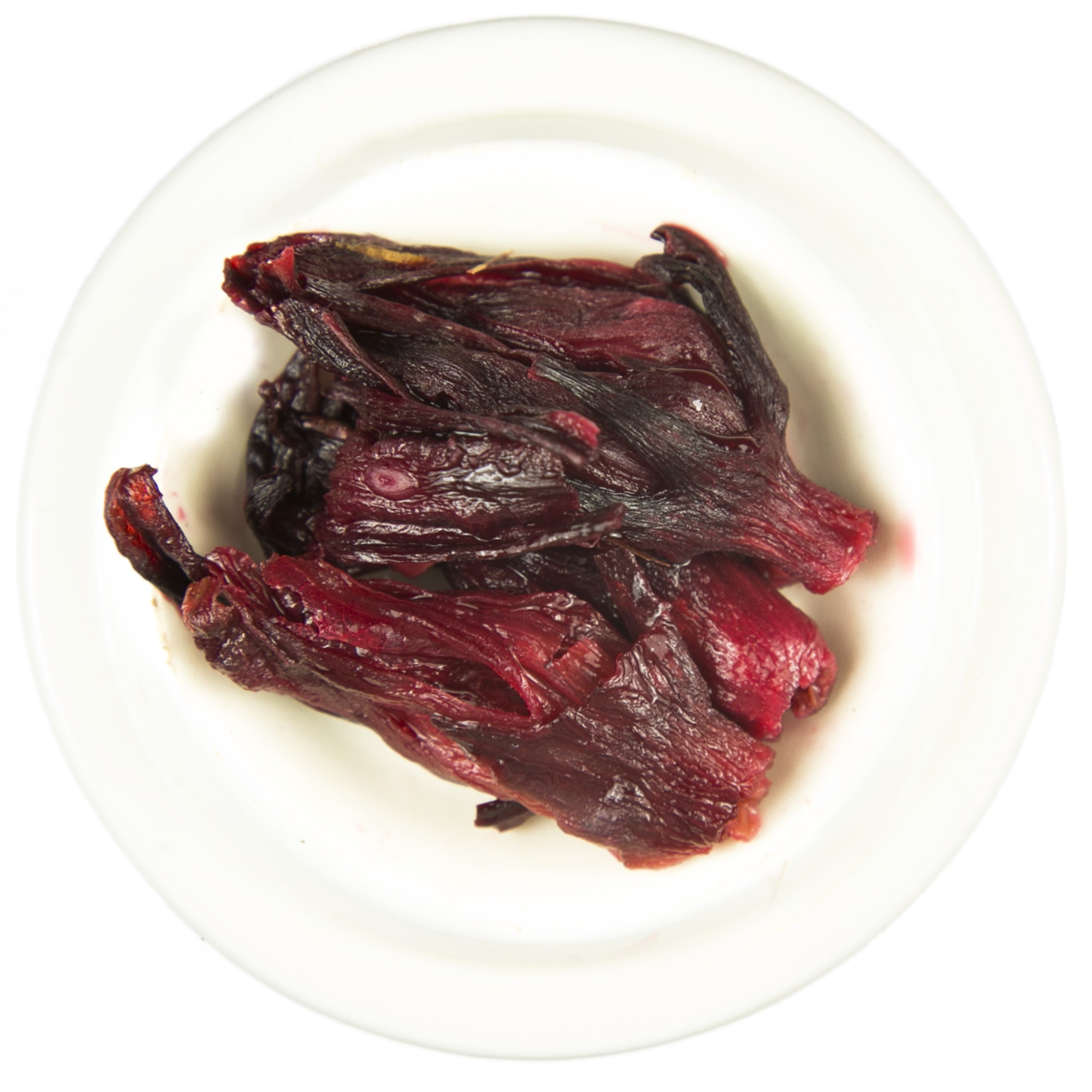Herbal Tea Brewing Guide

1 Teaspoon
Add 1 teaspoon per person and one for the pot.

95⁰c - 100⁰c
Boil using fresh water, at a temperature of 95⁰ - 100⁰c.

8 - 10 Mins
Steep for 8-10 minutes, depending on personal preference.
About Product
-
Product Description
This is the best Hibiscus Flower Tea. Known for its tart flavour considered reminiscent of cranberries or pomegranates, it is a Herbal Tea that has become increasingly popular in recent years. The primary reason is that drinking it for high blood pressure can help reduce levels.
Whether you’re here for its taste or health benefits, you’ll find it to be of the utmost quality and consistency.
About the Hibiscus Flower Tea Plant
There are an estimated three hundred species of the Hibiscus plant that belong to the Malvaceae family. But which Hibiscus Flower is used for Tea? We create our unique infusion with the Hibiscus sabdariffa variety, sometimes called Roselle or Carcade.
Commonly consumed in Africa, the Herbal Tea has since become widespread across the world due to its distinct characteristics when brewed.
Then there is its cultural significance. The Hindu Goddess Kali has a close association with Hibiscus. Meanwhile, in Hawaii, a woman placing the flower behind her right ear signifies that she’s single.
Placing it behind the left ear, on the other hand, indicates that she’s taken. Hibiscus is the state plant of Hawaii and the national plant of Malaysia. The next question is whether it contains caffeine.
How to Make Hibiscus Flower Tea
- Put dried Hibiscus Flowers for Tea into a Tea Filter or Infuser.
- Place the Tea-filled accessory in a cup, ready for brewing.
- Pour in freshly boiled water at temperatures of 100°C.
- Allow it to infuse for 5 to 10 minutes for the boldest flavour.
How to Serve: Consider honey or lemon. Alternatively, serve without additions.
Tasting Notes: Embrace a robust and tart flavour from start to finish.
Hibiscus Flower Tea Caffeine Content
Are Hibiscus Flowers good for Tea? They are indeed, especially if you’re hoping to cut down your caffeine intake. Almost all types of Herbal Tea – excluding South American Yerba Mate – are 100% devoid of the stimulating chemical compound.
Those needing a pick-me-up would do better with Black Tea or Roast Coffee. Anyone else will want to know how to make Hibiscus Flower Tea.
What is Hibiscus Flower Tea Good for?
To understand the infusion’s ability to support your life is to understand it’s nutritional facts. Its abundance of Vitamins A, B-1, B-2, B-9 and C, alongside Magnesium, Potassium, Calcium and Iron, play a role in lowering blood pressure, promoting weight loss and more.
While it’s essential to be aware of Hibiscus Flower Tea’s side effects in rare instances, it is, for the most, good news.
How, exactly, can Hibiscus Tea Benefits reduce the size of your waistline? For starters, it is a relatively low-calorie choice at a mere 37 calories per serving, making it an alternative to sugary or fatty soft drinks.
Furthermore, according to a 2014 study published in the Journal of Food & Function, individuals consuming Hibiscus Tea experienced decreased bodyweight, fat, BMI, and hip-to-waist ratio.
The topical application of the Herbal Tea ensures that you receive a wealth of antioxidants where you need them most. The high Vitamin C and beta-carotene content within the flowers treat itchy skin and inflammation.
On a molecular level, it combats free radicals in the body, slows oxidative stress, and ultimately reduces signs of damage. It even has anti-ageing properties that prevent premature wrinkles.
Perhaps its most famous capacity is lowering blood pressure. One 2010 study published in the Journal of Nutrition demonstrated that six weeks of consumption resulted in a significant decrease in systolic pressure.
In a 2015 clinical trial published in the Journal of Hypertension, similar findings were established. Numerous other research projects have drawn the same conclusions.
Hibiscus Flower Tea Pregnancy Considerations
A debate persists concerning Hibiscus Flower Tea and its influence on pregnant women. In a study conducted in 2013, the scientists involved discouraged expecting mothers from drinking it.
Correlations have also been found between women consuming it during pregnancy and delayed puberty in a child. Therefore, The Kent and Sussex Tea and Coffee Company recommends that you avoid it if pregnant.
-
Delivery Information
We offer reliable delivery services through Royal Mail to ensure that your orders reach you on time.
Here are the main points you should be aware of:
- Standard UK Delivery: £3.95 excluding delivery charge.
- Delivery Times: Orders are processed and dispatched within 2-5 working days but they may take longer during busy times. It is worth noting that all our orders are packed by hand in order to maintain the quality.
- Free Delivery: We are delighted to provide free shipping for UK orders over £35*. Moreover, customers from Europe can enjoy free shipping for any purchase above €75*. Furthermore, we offer free delivery in the USA for all purchases exceeding $125*. Please note terms and conditions may apply.
- Tracking: When your package is sent you will receive a tracking number via email so as to keep tabs of its progress.
International Shipping
We do ship worldwide meaning our products can be accessed by anyone around the world.
Here are some important details:
- Delivery Times: International deliveries vary based on destination, generally taking between 7-14 working days.
- Shipping Costs: International shipping costs are calculated at checkout based on your location and weight of your order. View full delivery charges for your location.
- Customs and Import Duties: Remember customs or import duties may exist depending on regulations in your country; these charges are borne by the customer.
Returns Policy
Your satisfaction is our top priority, however if for any reasons you’re not completely happy with your purchase, simply follow our returns procedure:
- Eligibility: Items returned within 30 days of receipt must remain unopened and in their original condition.
- Process: In order to return an item contact our customer service department using your unique order number after which detailed instructions will be given concerning returning them back to us securely.
- Refunds: Our aim is to refund you within 5-7 working days upon successful reception of returned goods. The refund amount will be credited to your original payment method.
For any other Enquiries or help please contact our Customer Support Team always at your service.
-
Product Reviews

 Loose Leaf Tea
Loose Leaf Tea Pyramids
Pyramids Tea Bags
Tea Bags Africa
Africa Assam
Assam Ceylon
Ceylon Chinese
Chinese Darjeeling
Darjeeling European
European Indian
Indian Japan
Japan Nepal
Nepal South East Asia
South East Asia Ayurveda Tea
Ayurveda Tea Black Tea
Black Tea Chai Tea
Chai Tea Flowering Tea
Flowering Tea Fruit Tisanes
Fruit Tisanes Green Tea
Green Tea Herbal Tea
Herbal Tea Matcha Tea
Matcha Tea Oolong Tea
Oolong Tea Organic Tea
Organic Tea Pu erh Tea
Pu erh Tea Rooibos Tea
Rooibos Tea White Tea
White Tea Asian Coffee
Asian Coffee Caribbean Coffee
Caribbean Coffee Central American Coffee
Central American Coffee South American Coffee
South American Coffee Coffee Blends
Coffee Blends Decaffeinated Coffee
Decaffeinated Coffee Espresso Coffee
Espresso Coffee Ethically Sourced Coffee
Ethically Sourced Coffee Flavoured Coffee
Flavoured Coffee Organic Coffee
Organic Coffee Single Origin Coffee
Single Origin Coffee Chocolate 1
Chocolate 1 Chocolate 2
Chocolate 2 Chocolate 3
Chocolate 3 Chocolate 4
Chocolate 4 Chocolate 5
Chocolate 5 Chocolate 6
Chocolate 6 Chocolate 7
Chocolate 7 Chocolate 8
Chocolate 8 Chocolate 9
Chocolate 9 Loose Tea Filters
Loose Tea Filters Tea Accessories
Tea Accessories Tea Bricks
Tea Bricks Tea Caddies
Tea Caddies Tea Caddy Spoons
Tea Caddy Spoons Tea Gift Ideas
Tea Gift Ideas Tea Infusers
Tea Infusers Tea Strainers
Tea Strainers





